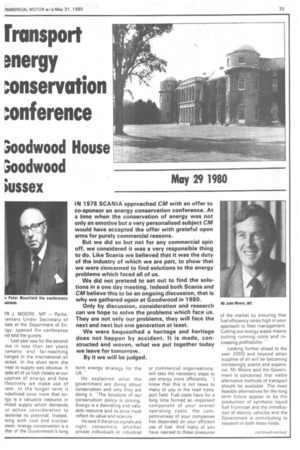'Transport energy :onsenration :onference
Page 37

If you've noticed an error in this article please click here to report it so we can fix it.
63oodwood House ;oodwood lussex
IR J. MOORE, MP — Parlialentary Under Secretary of late at the Department of Enrgy, opened the conference nd told the guests:
"Last year saw for the second me in less than ten years ramatic and far-reaching hanges in the international oil larket. In the short term the -treat to supply was obvious. It lade all of us look closely at our upplies of energy and how ffectively we make use of lem. In the longer term it nderlined once more that enrgy is a valuable resource in mited supply which demands ur active consideration to )aximise its potential. Indeed, long with coal and nuclear ower, energy conservation is a illar of the Government's long
term energy strategy for the UK."
He explained what the government are doing about conservation and why they are doing it. "The keystone of our conservation policy is pricing. Energy is a dwindling and valuable resource and its price must reflect its value and scarcity.'" He said if the price signals are right, consumers, whether private individuals or industrial or commercial organisations, will take the necessary steps to use energy more efficiently. "I know that this is not news to many of you in the road transport field. Fuel costs have for a long time formed an important component of your overall operating costs; the cornpetitiveness of your companies has depended on your efficient use of fuel. And many of you have reacted to these pressures of the market by ensuring that fuel efficiency ranks high in your approach to fleet management. Cutting out energy waste means cutting running costs and increasing profitability.'" Looking further ahead to the year 2000 and beyond when supplies of oil will be becoming increasingly scarce and expensive, Mr Moore said the Government is concerned that viable alternative methods of transport should be available. The most feasible alternatives for the long term future appear to be the production of synthetic liquid fuel from coal and the introduction of electric vehicles and the Government is contributing to research in both these fields.
continued overleaf




























































































































